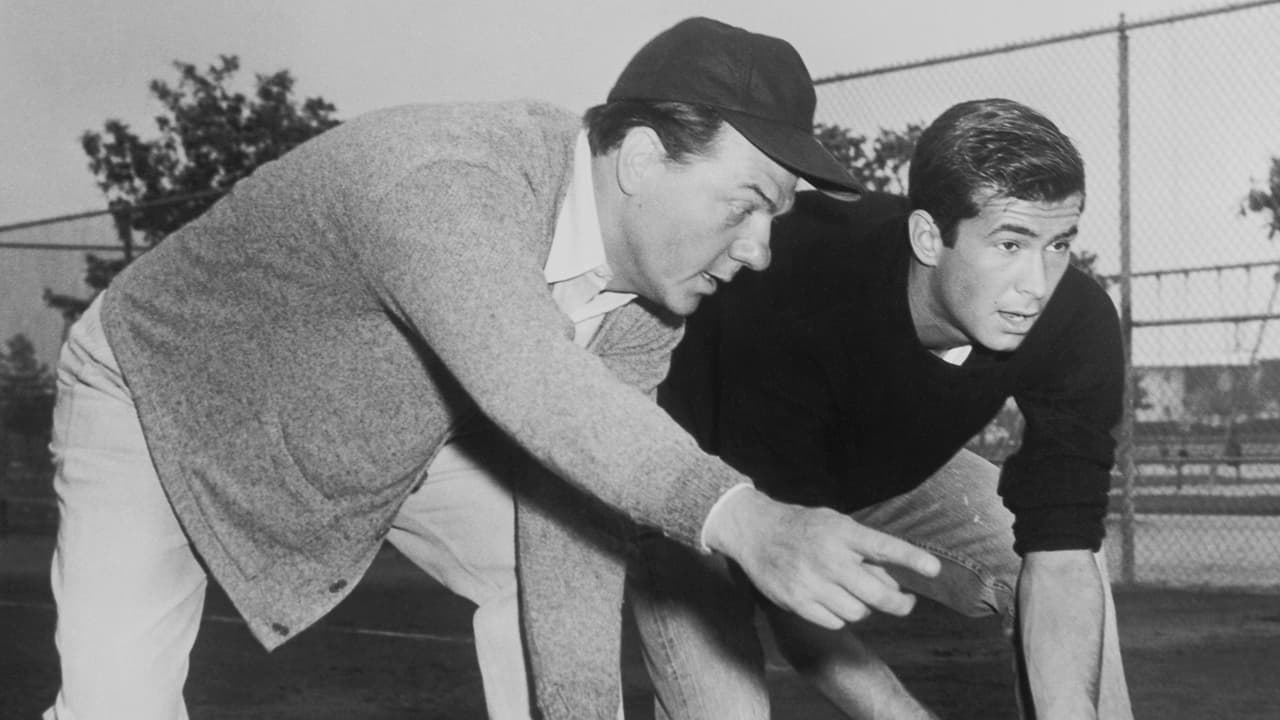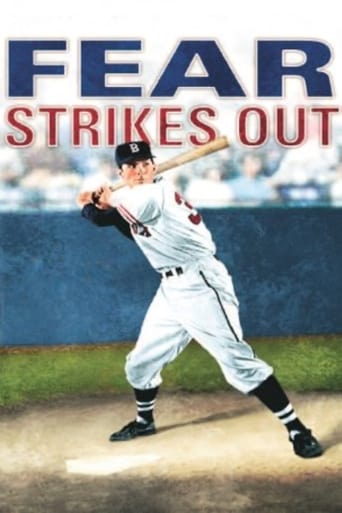

This story is about former Boston Red Sox Outfielder, Jimmy Piersall and his bout with and conquest of mental illness.* Before we get into the film, we should look at the real man, and his public life, much of which was witnessed by us Chicago Baseball Aficianados. (Bet you thought I' say 'Fans!) Jimmy Piersall was an outfielder in the Major Leagues from his debut in 1950 to his last game in 1967. He retired from Baseball with a very respectable .272 Lifetime Batting Average and a phenomenal Lifetime Fielding Average of .998!! That's damn near perfect! Piersall played for The Boston Red Sox (his local team),The Cleavland Indians, The Washington Senators and The Los Angeles/California Angels.Jim never did play for one of our Chicago teams, neither The Cubs, nor (my team) The White Sox. He did make a good name with the fans here by way of becoming Baseball Broadcaster.He arrived on the scene in 1977 and was teamed with Harry Caray to do the White Sox games. The way that Mr. Caray and company operated then allowed announcers to split time between the tube and the radio.Their styles and personalities meshed perfectly, and in the short 3 or so seasons they were together, we were treated to really great TV and Radio. And that's not just in the area of Sports. It got to be that the Caray-Piersall act was the greatest thing on TV, period. They pulled no punches in their commentaries on the Televised Games, a practice that did not go over in many circles, other than the Public, the Fans, if you will. (There, I said it!) Even though they were separated after not too long,(players, owners and the League's Office did not have much of a sense of humor. Piersall lost his Color Man/Analyst job and Harry Caray defected, choosing to go North to Wrigley Field and The Cubs.** Jimmy had various Sports Talk Shows and continues to this day in being a Baseball Analyst for one Chicago Radio Station or another. He still resides in the Greater Metropolitan Chicagoland Area.*** The film is similar to a lot of other Hollywood Sports films, which runs the gambit from PRIDE OF THE YANKEES (1942) to RUDY (1993). It does however, turn very serious very quickly, as the story shows a young boy Jimmy trying harder and harder to improve his Baseball skills to please his Father. The Father (Karl Malden) is characterized as being a sort of "slav driver" of a coach. Obviously living his vicariously through young Jimmy's talents and desire, he over manages the boy to the point of doing all his dealings with coaches and eventually with the Manager and Front Office of the Red Sox.Coming up to start the new season with the Big League Club, Jim is switched from being an Outfielder to Shortstop. He cracks under pressure and is hospitalized.The very sympathetic Physciatrist patiently works to build the young man's confidence. In one session, after the Doctor questions him about his father's role. After becoming somewhat defensive Jim abruptly blurts out, "My Father is the reason that I'm where I am today!", a profoundly truthful and revealing statement.Jim recovers, Mr. Piersall apparently was counseled, as he was more aware of his overbearing attitude. Jimmy returns to Baseball. Did they live happily ever after? Well, there was no pretense of this, because Piersall was still an active Major Leaguer at the time of the release of FEAR STRIKES OUT.Jim Piersall said many times that the story was highly embellished by Hollywood, referring particularly to the scene where Anthony Perkins, as Piersall, snaps during a game and starts climbing a screen at Fenwa=y Park. It never happened. He added that because of the payment by Paramount Pictures for the Screen Rights, he and his family were able to really improve their lives financially.Once again, you Parents of Little League Players, Junior Football, or whatever Sport, be the kids Girls or Boys, please watch this film and heed its lessons! PLEASE!!* Jimmy Piersall never seemed to shy away from talking about his breakdown. He even said he capitalized on having reputation as a 'flake'(his words)while an active player. When doing a White Sox telecast, during a discussion, Harry Caray slipped, saying "You're crazy, Jimmy!" To which he replied, "Yes I am, Harry! And I've got the papers to prove it!"** It seems an awful lot of Cub Fans forget Harry's 12 seasons with the Sox, not to mention 1 with Oakland A's and 20 some as voice of the St. Louis Caedinals, where he started his Broadcast Career.*** Wow! Hows that for redundancy, get it? Greater Chicagoland Metropolitan Area! Ha, Ha.....!!
... View MoreEven though I have noted this to be a spoiler review, I will mark the few spoilers within the comment.In reality, Jimmy Piersall was a gifted outfielder who battled bipolar disorder throughout his life, especially during his playing days in a time when lithium had not yet been discovered as a drug treatment for the disorder. (If anyone wonders, that treatment began in 1958.) That's not the character the film portrays. Instead, this Jim Piersall (Who is oddly never called "Jimmy," considering that he is almost exclusively known as "Jimmy" in reality.) is a kid (presumably only 23 years old at the film's close, based on his real-life history) pushed too hard, too far, and too fast by his father, resulting in a mental breakdown that requires him to face his true feelings about his father. However, as long as one does not expect to see the lifelong bipolar disorder struggle portrayed, this film does easily merit the viewing.The easiest part of the film to appreciate is the excellent acting, especially by the always-excellent Anthony Perkins. Perkins manages to convey such varying emotions and degrees of emotion that it boggles the mind. He ranges everywhere from an insane anger to a subtle feeling of pain hidden under a look of beaming happiness and does so with a dexterity rarely found in any actor. Karl Malden also deserves some credit for an excellent performance as the driving, overbearing-but-loving father. He never needs any dialogue to tell us how he feels about his son or why he pushes Jim the way he does, because his face tells it all. No other characters in the film really gave the actor the opportunity to show tremendous ability.However, the direction is also excellent. Robert Mulligan reinforces his film's themes with constant images showing Jim behind or between bars, as though he is trapped in his path (until of course the mental hospital, where such visual entrapment never occurs). He even goes so far as to show John Piersall handing his son a letter saying that scouts from the Boston Red Sox are coming to town to see him, a scene that would seem to bring the two together as they have nearly accomplished their shared goal, with a fence separating them. The scene is one of the most poignant in all of film history. Even the ending of the film is shot with a particular eye to detail that rewards the careful viewer.*Note: This paragraph is about hints from close viewing, so there are some small spoilers. None should hinder enjoyment of the film, but one should be warned.* There are also a number of subtle hints that seem to suggest that Piersall's problem is more than a temporary breakdown. First of all, his father at one point tells his mother, "I don't want you going away again," suggesting that perhaps she has the same issues Jim does. Secondly, the conclusion of the film is ambiguous, showing a beaming Jim Piersall headed onto the field of play bathed in a heroic, heavenly bright overhead light, but doing so from such a distance as to suggest that perhaps this ending isn't assured. These elements may have been to suggest the bipolar disorder from which Piersall actually suffered while presenting his case as it would have appeared at the time it occurred. The original Diagnostic and Statistical Manual of Mental Disorders appeared in 1952, so certainly bipolar disorder's existence was already established (and the term was coined around the turn of the century, by Emil Kreiplin if memory serves) and could have been incorporated into the film. It's an interesting close viewing element of the film, at least. *Spoilers over* Overall, "Fear Strikes Out" may have been something of a distortion of reality (and obviously Jimmy Piersall himself thought so) and it probably oversimplifies Piersall's psychological problems, but it does tell its own story beautifully and artfully with incredible performances and spot-on direction. The only real issue I have with the film is the score, which was so over-dramatic as to undercut the real emotion of the film. It is definitely recommended.
... View MoreOutstanding biography detailing the life of Boston Red Sox slugger Jimmy Piersall.The late Anthony Perkins depicted the appropriate temperament in his portrayal of this baseball legend. Driven by a domineering, obsessed with perfection father, Perkins is outstanding in his portrayal. He is equally matched by Carl Malden, terrific as the father.From childhood Perkins is seen as being driven by his father to achieve perfection. Nothing less will satisfy the compulsive driven father.The scene where Perkins goes berserk during a game is memorable.His recovery is well staged as well. My diagnosis would have been to keep his father away but to make sure that the viewers see this wonderful film.
... View MoreJimmy Piersall (Anthony Perkins) was a major league baseball player, an exceptional outfielder and a lousy hitter. He had an overbearing perfectionist for a father (Karl Malden), was socially awkward, suffered from severe bipolar disorder and paranoid delusions, and fought with his teammates. That is pretty much where the similarities between "Fear Strikes Out" and reality end.The story takes place in the early 1950s. Little was known about mental illness, and there were few if any psychiatric medications. There wasn't much beyond talk therapy and electro-convulsive therapy (then known as electro-shock treatment). Unfortunately, Jim responded to neither. He spent most of his rookie year in a psych hospital.In one chilling (although probably invented) scene, psychiatrist Dr. Brown asks if he wants to watch a ball game. Jim doesn't respond, so the doctor flips on a game. A hitter doesn't extend a double into a triple, a play which Jim comments that his father would never approved of. As the conversation moves from baseball to Jim's father, Jim realizes "If it wasn't for my father, I wouldn't be where I am today!" The film ended in typical Hollywood fashion, with Piersall returning to the team in 1953. I thought the roll of his wife Mary, played ably by Norma Moore, was badly underwritten. There was no mention of the fact that his mother also suffered from mental illness.As a study of mental illness and its effects on a man, his family, his co-workers, and his career, "Fear Strikes Out" is a very good movie. Trouble is that it is so loaded with historical inaccuracies, mistakes, and "dramatic license" that the person upon whose experiences the story is based distanced himself from the movie.
... View More